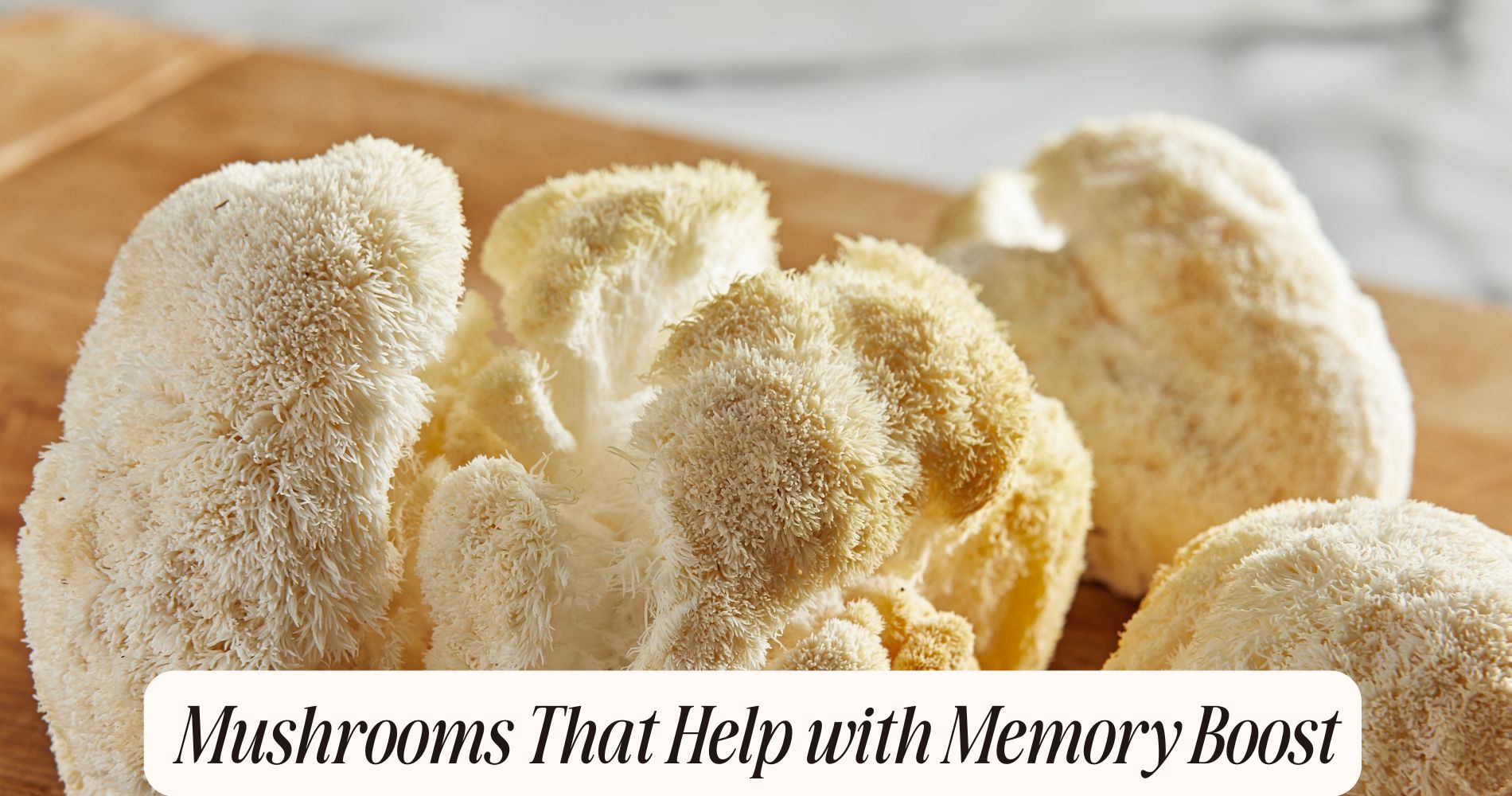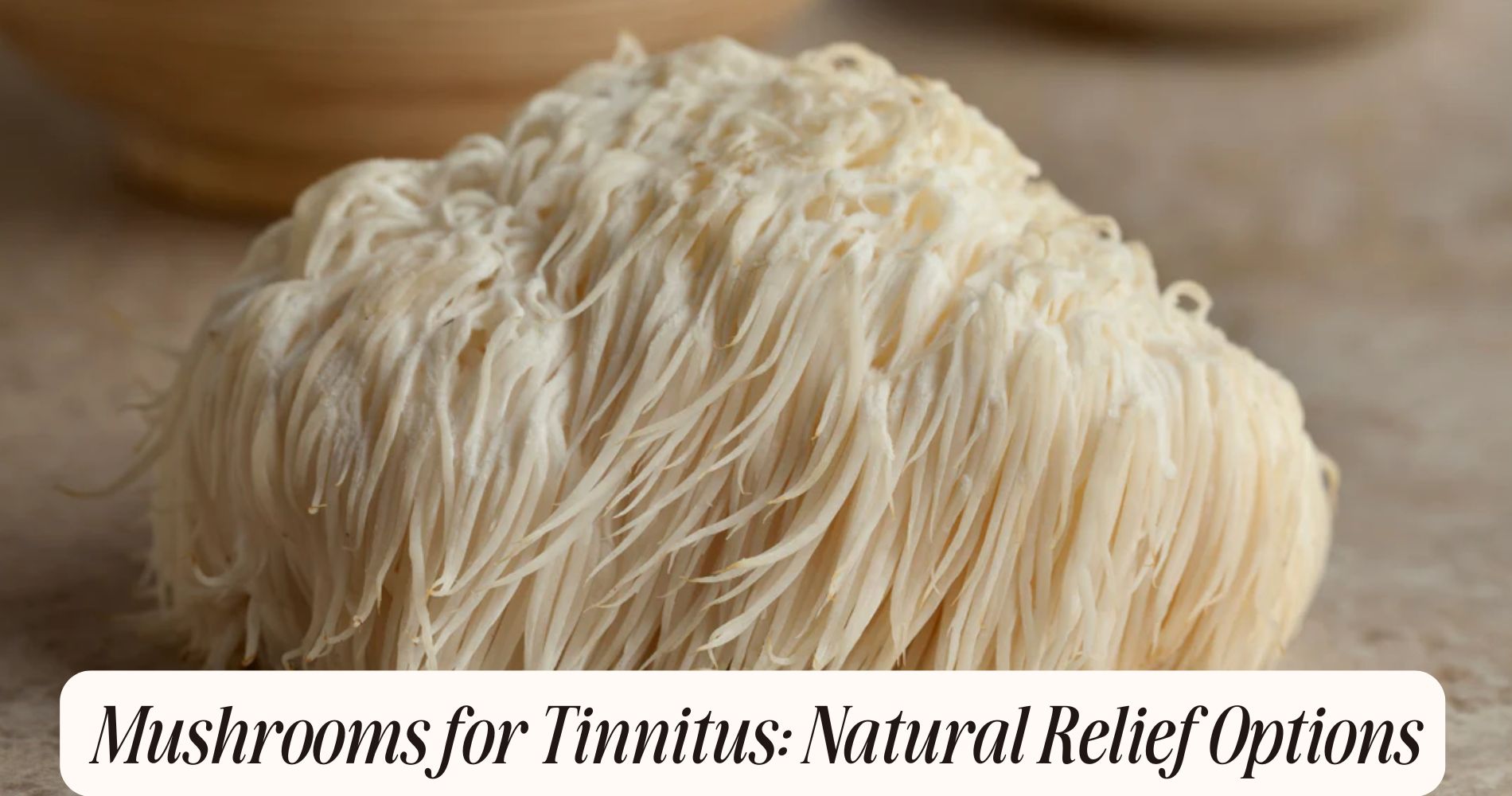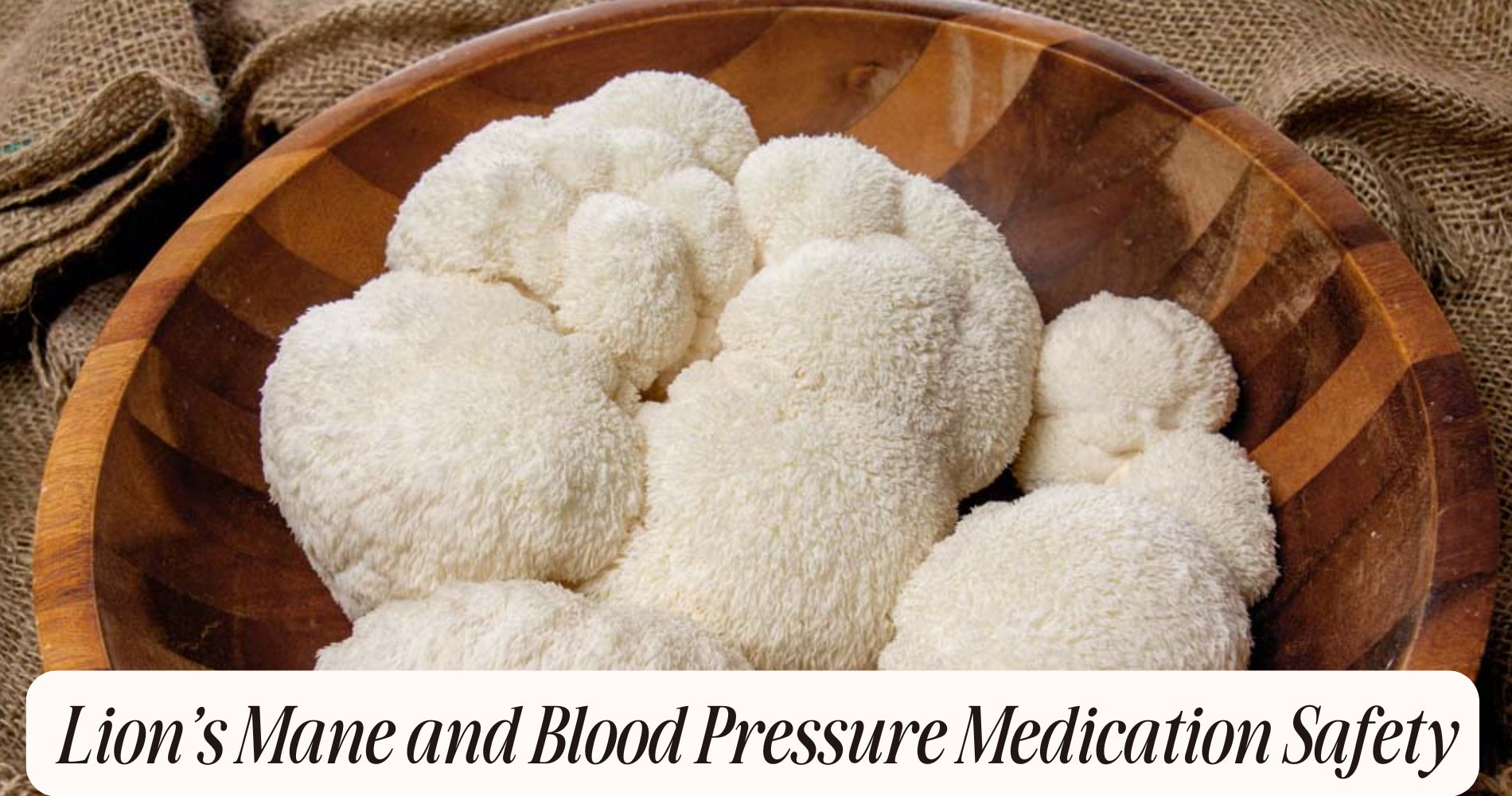Certain mushrooms that help with memory include Lion's Mane, Reishi, Cordyceps, Chaga, Shiitake, and Maitake. Lion's Mane contains compounds that promote nerve growth, enhancing memory and cognitive function. Reishi helps modulate neurotransmitters and reduce oxidative stress, supporting brain health. Cordyceps aids in oxygen utilization and offers neuroprotective benefits. Chaga’s antioxidants protect neurons, while Shiitake’s nutrient-rich profile contributes to brain health. Maitake helps reduce neuroinflammation, potentially boosting cognitive performance. Adding these mushrooms to your diet could lead to noticeable improvements in memory. Read on to learn effective ways to incorporate them into your routine for optimal results.
Lion's Mane Mushroom
When it comes to enhancing cognitive function, Lion's Mane Mushroom stands out as a promising contender. This unique fungus contains bioactive compounds like hericenones and erinacines, which have been shown to stimulate nerve growth factor (NGF) production. NGF plays an essential role in the maintenance and survival of neurons, thereby contributing to improved brain health.
Research indicates that regular consumption of Lion's Mane can lead to significant memory enhancement. In various studies, participants demonstrated better cognitive performance after supplementing with this mushroom. This effect can be attributed to its neuroprotective properties, which help combat oxidative stress and inflammation—two factors known to impair cognitive function.
By promoting neurogenesis, Lion's Mane aids in the formation of new neural connections, enhancing both short-term and long-term memory. Additionally, its potential to alleviate symptoms of anxiety and depression can indirectly support cognitive function, as mental well-being is closely linked to brain health.
Incorporating Lion's Mane into your diet could be a strategic move if you're looking to boost memory and overall cognitive performance. Whether consumed as a supplement or in culinary dishes, its benefits for brain health are compelling.
Reishi Mushroom
Reishi mushroom offers potential cognitive benefits that can enhance your memory function.
You can consume Reishi in various forms, including powders, capsules, and teas, making it easy to incorporate into your daily routine.
Recent research studies highlight its effects on cognitive health, providing a solid foundation for further exploration.
Cognitive Benefits of Reishi
The cognitive benefits of the Reishi mushroom, known scientifically as Ganoderma lucidum, are gaining attention in both traditional and modern medicine. Researchers have identified several bioactive compounds in Reishi, including triterpenes and polysaccharides, which contribute to its potential for cognitive enhancement. These compounds may improve neuroprotection and support the overall health of neural pathways, promoting better memory and learning capabilities.
Studies suggest that Reishi can modulate neurotransmitter levels, particularly serotonin and dopamine, which are essential for mood regulation and cognitive functions. By optimizing these neurotransmitters, you may experience improved focus, reduced anxiety, and enhanced mental clarity.
Additionally, the antioxidant properties of Reishi help combat oxidative stress, a known contributor to cognitive decline.
Furthermore, the anti-inflammatory effects of Reishi may protect the brain from chronic inflammation, which is linked to neurodegenerative diseases. This multifaceted approach to cognitive enhancement positions Reishi as a promising candidate in the field of natural supplements aimed at improving memory and overall brain health.
How to Consume Reishi
Many people seek ways to incorporate Reishi mushroom into their diet for its cognitive benefits. One effective method is consuming reishi tea, which involves steeping dried reishi slices or powdered reishi in hot water.
This extraction process allows the beneficial compounds, such as triterpenes and polysaccharides, to infuse into the water, enhancing its cognitive-enhancing properties. To optimize the benefits, steep the tea for at least 15 to 20 minutes, ensuring you receive a potent brew.
Alternatively, you might consider reishi capsules. These provide a convenient and concentrated source of Reishi's active components.
When choosing reishi capsules, look for products that specify the concentration of active ingredients, ensuring you're consuming an effective dose. Typically, the recommended dosage ranges from 1,000 mg to 2,000 mg daily, but it's wise to consult a healthcare professional before starting.
Regardless of your chosen method, integrating Reishi into your routine can be a straightforward process.
Monitor your body's response and adjust your intake accordingly to maximize the cognitive benefits. By doing so, you'll be taking a proactive approach to enhancing your memory and cognitive function through the power of Reishi mushroom.
Research Studies Overview
Research on the cognitive effects of Reishi mushroom has gained traction in recent years, shedding light on its potential benefits for memory enhancement. Several studies have focused on its neuroprotective properties, which may help mitigate cognitive decline associated with aging and neurodegenerative diseases.
In vitro and animal studies have shown that compounds within Reishi, such as triterpenoids and polysaccharides, exhibit significant antioxidant activity. This activity is essential as oxidative stress is a known contributor to memory impairment.
In addition, research indicates that Reishi may support neuronal health by promoting neurogenesis and synaptic plasticity, both critical processes for memory formation and retention.
Clinical trials involving human subjects are still limited but show promising preliminary results. Participants consuming Reishi extracts demonstrated improved cognitive performance and memory function compared to control groups.
These findings suggest that incorporating Reishi into your diet could provide protective benefits for your brain health.
Cordyceps Mushroom
Cordyceps mushrooms have gained attention for their potential cognitive benefits, particularly in enhancing memory and mental clarity. Research indicates that cordyceps may improve oxygen utilization and energy metabolism in the brain, which can lead to better cognitive performance.
The active compounds, such as cordycepin, have shown promise in promoting neuroprotection and reducing oxidative stress, both of which are critical for maintaining peak brain function.
When considering cordyceps benefits, it's crucial to understand the ideal cordyceps dosage for cognitive enhancement. Studies suggest a daily intake of 1,000 to 3,000 mg of cordyceps extract, although individual responses may vary.
It's advisable to start at the lower end of this range and gradually increase the dosage while monitoring effects on memory and focus.
Additionally, you should consult with a healthcare professional before integrating cordyceps into your regimen, especially if you're taking other medications or have existing health conditions.
Chaga Mushroom
Chaga mushrooms have emerged as another promising contender in the domain of cognitive enhancement. Known for their rich antioxidant content, particularly melanin and superoxide dismutase, these mushrooms may help protect neurons from oxidative stress, which is vital for maintaining cognitive function.
You'll find that the chaga benefits extend beyond memory improvement, potentially supporting overall brain health.
When considering chaga preparation, it's important to know that the mushrooms are typically harvested from birch trees and can be used in various forms. You can brew chaga tea by steeping ground chaga in hot water, allowing beneficial compounds to be extracted efficiently.
Alternatively, you might choose to create a tincture, which involves soaking chaga in alcohol for an extended period, resulting in a concentrated extract.
To maximize the cognitive benefits, you're encouraged to integrate chaga into your daily routine consistently. However, always consult with a healthcare professional before making significant dietary changes, especially if you're on medication or have existing health conditions.
Shiitake Mushroom
When it comes to cognitive enhancement, shiitake mushrooms stand out due to their unique nutritional profile and potential neuroprotective properties. Rich in polysaccharides, particularly lentinans, shiitake nutrition offers immune-boosting benefits that may indirectly support brain health. These compounds can help reduce inflammation, a key factor in cognitive decline.
Moreover, shiitake mushrooms contain B vitamins, including B2 and B5, which play essential roles in energy metabolism and neurotransmitter synthesis. By incorporating shiitake into your diet, you can guarantee your brain receives essential nutrients for peak function.
Consider shiitake recipes like stir-fries or soups to easily integrate these mushrooms into your meals.
Additionally, shiitake's high levels of ergothioneine, a powerful antioxidant, may protect neurons from oxidative stress. This property is fundamental for maintaining cognitive function as you age.
Maitake Mushroom
Building on the benefits of shiitake mushrooms, maitake mushrooms also offer significant advantages for cognitive health. These mushrooms are rich in bioactive compounds, particularly polysaccharides such as beta-glucans.
These compounds have been shown to enhance immune function and may improve cognitive performance by reducing neuroinflammation. Studies suggest that the anti-inflammatory properties of maitake mushrooms can protect brain cells from oxidative stress, which is essential for maintaining memory and overall cognitive function.
Incorporating maitake into your diet is straightforward. You can explore various maitake recipes, such as sautéed maitake with garlic and herbs, or add them to soups and stir-fries.
These culinary uses not only enhance flavor but also provide essential nutrients that support cognitive health.
Moreover, maitake benefits extend beyond memory enhancement. They may also play a role in regulating blood sugar levels and promoting heart health, making them a valuable addition to your dietary regimen.
Frequently Asked Questions
Can Mushrooms Be Taken With Other Supplements for Memory?
Yes, you can take mushrooms with other supplements for memory. However, you should be cautious about potential supplement interactions. It's best to research mushroom combinations thoroughly and consult a healthcare professional before beginning any regimen.
Are There Any Side Effects of These Memory-Boosting Mushrooms?
Certain mushroom varieties can have side effects, especially at high doses. You should follow dosage recommendations carefully to minimize risks. Common side effects include digestive upset, allergic reactions, and potential interactions with other supplements or medications.
How Should I Prepare Mushrooms for Maximum Memory Benefits?
To maximize memory benefits, you should sauté or steam mushroom varieties like lion's mane or reishi. These cooking methods preserve nutrients while enhancing bioavailability, ensuring you gain the most from your culinary experience.
Can Children Consume Memory-Boosting Mushrooms Safely?
Yes, children can safely consume certain mushroom types, like lion's mane and reishi, following dosage guidelines specific for their age and weight. Always consult a healthcare professional before introducing any new supplements to their diet.
How Long Does It Take to Experience Memory Improvements?
You'll typically notice memory improvements within a few weeks when consuming specific mushroom varieties at their ideal dosage. Individual responses vary, so consistent use and monitoring your progress are essential for evaluating effectiveness.
Conclusion
Incorporating mushrooms like Lion's Mane, Reishi, Cordyceps, Chaga, Shiitake, and Maitake into your diet can markedly enhance memory and cognitive function. Each of these fungi possesses unique bioactive compounds that contribute to neuroprotection and improved brain health. By understanding their individual properties and effects, you can strategically select the types of mushrooms that best align with your cognitive goals. Embracing these natural supplements may foster not only memory enhancement but also overall mental clarity and well-being.









